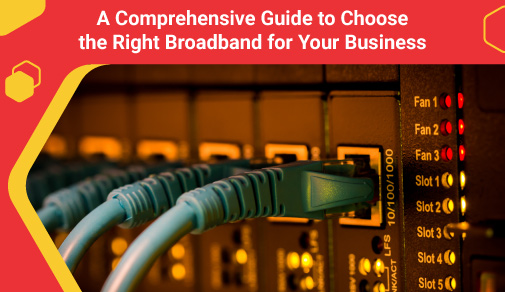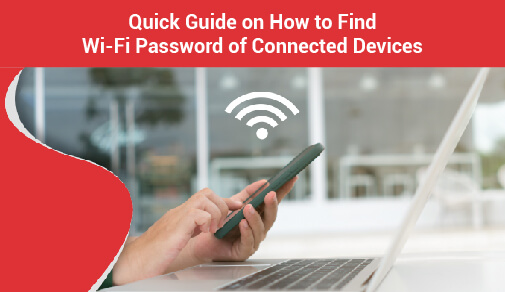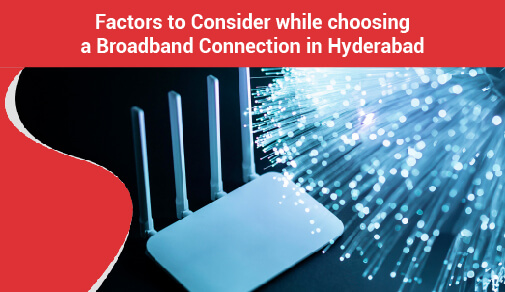Broadband Services for Small or Medium Enterprises
-
0
-
-
9 minutes

Businesses perform most of their routine tasks online these days. Therefore, getting an internet connection becomes one of their primary requirements. With the internet, they manage their marketing stints, social profiles, and branding strategies. Online research helps them stay in touch with evolving customer preferences.
If you run a small or medium-scale business, you would be compelled to get an internet connection. Getting the internet for business is similar to availing broadband services for personal requirements. Yet, the connectivity should be much more stable, reliable, and powerful than an ordinary connection.
Differences between Residential and Business Internet Service
First, you must note down the difference between residential and business internet service. A residential internet service would be enough if you need the internet for basic activities like checking emails. Higher bandwidth is essential if you provide services like video customer support to your customers.
A residential internet service will provide you with a high download speed. An internet for business needs may offer equal download and upload speeds. It is so because businesses need to upload and share files on the go.
Business broadband services come with flexible configurations that allow you to scale the internet services as per your needs. Residential internet services come with basic configuration and are faster to install. They are also far cheaper than the business internet service plans.
Broadband for enterprise comes with static IP addresses. It helps you to host your servers and manage remote connections. The broadband services offered by an enterprise-level broadband plan are more reliable and consistent. They do not experience frequent lags or downtimes like your regular internet connection.
Business broadband plans come with SLAs (Service Level Agreements) which provide you with guaranteed uptime and dedicated technical support. Faster response times can be expected from these plans as compared to regular internet connections.
How to choose the best broadband services for your business?
Once you figure out the differences between residential and business internet services, start exploring more about business broadband services. The question that arises is how to choose broadband services for your commercial needs. Here are a few things that you must consider before making a decision:
1. Connection Type
The type of internet connection you use will determine its speed, reliability, and other features. The days of dial-up internet connections are gone since they are too slow to accommodate the demands of new-age internet users.
If you live in a remote open area that has clear weather for most of the days, getting a satellite connection would make sense. It is not a good option if there are too many trees or buildings nearby.
Most people still use a DSL (Digital Subscriber Line) these days. It is nothing but broadband services being offered via telephone and television cable lines.
A standard cable connection can be better than a DSL in most conditions. Yet, the network connectivity gets shared among multiple users located in the same area. Therefore, the internet speed may get slow during peak working hours.
Getting Fibernet broadband services seems to be the best option if you need reliable and powerful internet. Fibernet operates via fibre-optic lines and transmits data via light pulses. As a result, the connection is the strongest when you subscribe to a Fibernet internet service.
Before choosing a business internet service in your area, talk with the local ISPs. Discuss your requirements with them, explore all the available options, and then make a decision.
2. Upload and Download Speeds
As a business owner, you must figure out the upload and download speeds offered by your ISP. Your internet requirements will determine the kind of download speeds you require.
If you need the internet only for browsing the web and viewing emails, a download speed of 5 Mbps is sufficient. To indulge in video conferencing, CRM activities, and other business activities simultaneously, you would need a download speed of up to 150 Mbps.
You might need to connect multiple devices in your business location. Also, you may need to take their backups regularly. In such cases, get dedicated business broadband services that offer download speeds of up to 500 Mbps.
While most businesses focus only on download speeds, having fast upload speeds also matter. With superfast upload speeds, you can upload cloud files, marketing videos, and do similar tasks without any hassles.
3. Data Limit
Data usage limit should be one of your primary concerns while getting a business internet service. ISPs offer data plans with a data cap. Once you cross this limit, the speeds will get slower as per FUP (Fair Usage Policy).
Yet, some ISPs also offer unlimited data plans that can cover your data-intensive tasks without any issues. If your data usage is on the heavier side, you must opt for such plans. Yet, remember that you will have to pay a higher price to get such unlimited data plans.
For example, ACT Fibernet offers unlimited data plans in Bangalore, Hyderabad, Jaipur, Ahmedabad, Delhi, and other cities. If you get any of these plans, you do not have to pay extra charges after reaching the data usage limit.
With an unlimited plan, you can connect multiple devices and indulge in data-intensive tasks without any worries. Data speeds up to 1 GBPS are available with the ACT Fibernet broadband services. To get more knowledge about their unlimited data plans, visit their website today!
4. Adaptability
While getting the internet for small business, you must also consider the future growth possibilities. Once your business starts growing, you will need additional data and a powerful internet to manage multiple devices. The broadband services that your ISP provides should help you in adapting to these changing requirements.
Here are a few things to consider when it comes to determining the flexibility and adaptability offered by ISPs:
1. Availability: You might plan to expand your business to other locations in the future. Ensure that the ISP you choose provides broadband services in those locations as well.
2. Wide range of services: As your business evolves, so will your internet needs. You must choose an ISP that offers a wide range of broadband plans. It will help you to avail of the internet services per your usage, speed, and other requirements.
3. Bandwidth: While operating a small or medium enterprise, you may have to transfer or share data at a consistent rate. The rate at which the data is transferred is measured in bandwidth. A higher bandwidth indicates that concurrent data transfers between multiple devices get managed. Large businesses seek broadband services that can offer bandwidths of up to 500 Mbps. However, a small business may not require such a high bandwidth. Yet, seek a bandwidth of at least 100 Mbps to carry out most of your routine tasks without any hassles.
4. Latency: A higher bandwidth means that the data gets transferred quickly from one point to another. This time is measured in latency. As a result, broadband services that offer a lower latency are ideal for your evolving business. A latency of around 40 to 60 milliseconds is considered ideal in any situation. If the latency is more than 100 milliseconds, you will experience some lag between data transfers.
5. Security
Businesses handle sensitive financial data. Their systems and servers also contain the personal data of their users. Therefore, you must aim at getting business broadband services that come with standard security measures.
As a small business owner, you may not have access to a dedicated IT team to handle your security requirements. As a result, you should get broadband services from a reliable ISP.
The ISP should integrate various security measures to secure your sensitive business data. 24/7 vigilance, limited access to outside users, and other measures should be employed by your ISP.
The broadband service provider must integrate enterprise-level security protocols in the network. Firewalls, antivirus software, and other technologies will keep your system safe from intrusion, cyberattacks, and viruses.
The ISP must also provide 24/7 dedicated customer support services. The support team will address all your queries and concerns regarding security without any delay.
6. Reliable Connectivity
Having a stable and reliable internet connection must be among your top priorities when choosing business broadband services. If your broadband services are not reliable, your employees will lose a lot of time. It will hamper their productivity which will also affect your business operations and revenue.
Investing in a reliable internet connection is not an easy task. You will have to list down your business requirements and find the best internet plan that suits your budget.
A regular residential broadband connection would be sufficient if you need internet for only 3 to 5 employees. A suitable small business internet plan can be opted for if your internet usage requirement is on the higher side.
7. Static and Dynamic IPs
ISPs provide both static and dynamic IPs (Internet Protocols) through their service plans. Dynamic IPs are ideal if you do not need a dedicated IP configuration on your router.
If you plan to run remote connections or servers, you would need static IP addresses. Some ISPs provide static IPs by default with their broadband services meant for enterprises. Some ISPs offer them at an additional rate. Dynamic IP addresses are available by default with most internet plans.
Through static IP addresses, you can provide remote connections to multiple users. You can host a website or server for managing emails, VPNs, or cloud services. Having static IPs makes sense when you want to configure client applications on your systems.
Multiple servers can be managed using a single static IP address. If you want multiple IPs, you can assign different IPs to visitors, employees, end users, etc. It helps you manage the data flow and network connection with ease. Also, you can integrate security measures like Firewall for the IPs that contain sensitive customer data.
However, if you do not have such requirements, it is always beneficial to opt for dynamic IPs. Hackers won’t be able to track down your IPs. Also, you would be able to manage your business's internet service requirements without any hassles.
Choose static or dynamic IPs as per your specific business requirements. Businesses go for static IPs if they operate most of their business processes through online means.
8. Email Services
As a small or medium-sized business owner, you may have a limited budget at your disposal. It makes sense to avail of broadband services that come with maximum features and benefits.
Some ISPs offer a specific number of email accounts with their broadband plans. They can provide the email addresses with their domain name. Some of them might also allow you to customise the email addresses as per your company name.
You should check whether the service provider offers web-based or application based (like MS Outlook) email services. Ensure that the ISP offers spam filtering options and secure access to emails.
Conclusion
These were some key considerations to make while selecting business broadband services. The best approach would be to evaluate your needs and choose a plan that suits your budget and specific business requirements.
ACT Fibernet offers comprehensive business internet service in most Tier-1 and Tier-2 cities. You can avail of their broadband connection to get reliable connectivity along with faster upload and download speeds.
A responsive customer support team, static IPs, and unlimited data plans make it the best ISP in your area. Visit its website today and explore the best business broadband services for your small and medium businesses!







